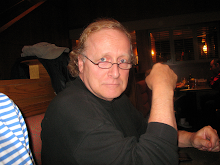Three weeks ago, I began the series about what would happen
if I ran the city, or the county, or the state. As with most city things, it's taken a long while to follow through with a second effort, but, what the heck, at least from me, you see a second effort. Today, I address the curious pastime of "midnight baseball."
Do you remember the hoopla over that benighted idea of Mike White's,
the midnight basketball program? That's the program that was designed to keep the young people ages 18-25 off the streets at night, but which also had the effect of keeping them off the streets at 5 and 6 in the morning, when other people were getting up and going to jobs, or getting out looking for jobs. Well, the enterprising yoot (youth) of our neighborhood have done Mike one better with the concept of
midnight baseball, and it seems to be picking up in popularity, from all I can see.
It's an interesting concept. The yoot merely roam the streets with baseball bats, looking aggressive, wearing their game faces, and see what all happens. I guess they're looking for some sort of pickup game, or something, and I don't recognize them as being from our neighborhood, so they must be the visiting team. What I can't figure out is what these enterprising yoot are going to do once they find a game, because none of them ever has a ball or a mitt, but maybe their other equipment is lurking somewhere in those baggy pants.
Anyway,
if I ran the city, I would make sure these yoot had their balls or mitts in plain sight when they were cruising looking for a midnight baseball game. If these accoutrements weren't in plain sight, I would instruct my police to stop them and make sure their collective pants were loaded with enough equipment to last 9 innings and field a full two teams--police are always great for supporting yoot sports events. Even if they did have their game balls on display, sort of like they do their boxer shorts, I would have the police stop them and find out when and where the game was, so we could all come out of our houses again and begin walking our dogs again over to the midnight baseball field, where we would watch our yoot do something intrinsically American and sportsmanlike and constructive, and root, root, root for the home team, our own little home boys. I still don't know how they're going to round the bases without getting all tangled up in those pants, and most of their hats are too big to make it with them all the way down the first base line, but maybe they know something about wearing these new clothes that I don't.
We had about 80 yoot up the street here on Denison near Fulton last night and early this morning, and we really as a community have to get over to them and give them some special coaching. They're confused. They don't know the difference between midnight baseball and midnight track. Some of them must have thought they were at a track meet, because I heard their starter guns go off a good many times, and there must have been some false starts, because some of the reports of the starter pistols were really close together. The police coaches from the Second District came over to make sure they didn't have so many false starts, but then the police coaches left and the false starts cranked up again soon after. Perhaps they're uncoachable. I can't really say too much more, because none of the kids were from around here, and I don't know them. Also, they need to learn how to stay in their lanes, and how to point the starter pistols in the air and not at each other.
Another thing--I wonder where their parents were, and whether the kids weren't so tired they couldn't get up for church this morning. And where are all the priests and ministers and social workers when you need them? Seems like they preach and evangelize and prescribe but then go home at 5 every day and get a paycheck, too, while the yoot just seem to run around without direction, all confused, and we have to use the public dollar to get the police coaches to intervene. The clergy and the social workers should have been out helping clear the streets last night, so that the wayward yoot could get to church today.
So,
if I ran the governments, my social workers would live in the middle of the people they ministered to, so they could take care of minor confusions 24 hours a day, my police-coaches would be instructed to stop and check confused yoot to make sure they had all the proper sports equipment for the big pickup game and to find out the ever-changing game schedule, and I would gradually change the midnight baseball and midnight basketball and nocturnal track schedules to make sure everybody would be able to get a good night's rest and get up bright-eyed and bushy-tailed for work at 5 AM the next day, except on Saturday, when I would make sure they could make it to sunrise services.
I would do this all up close and personal, and I'd get to know each and every one of them. They are part of our community, they are a big part of our future, and we must become a big part of theirs--24 hours a day. This is no longer a situation where everybody goes home at 5 and considers the job done. Somebody has to be there in the neighborhoods to set the example, perpetually. That's what a healthy community's all about--integration of all levels, not separation by economic class.




